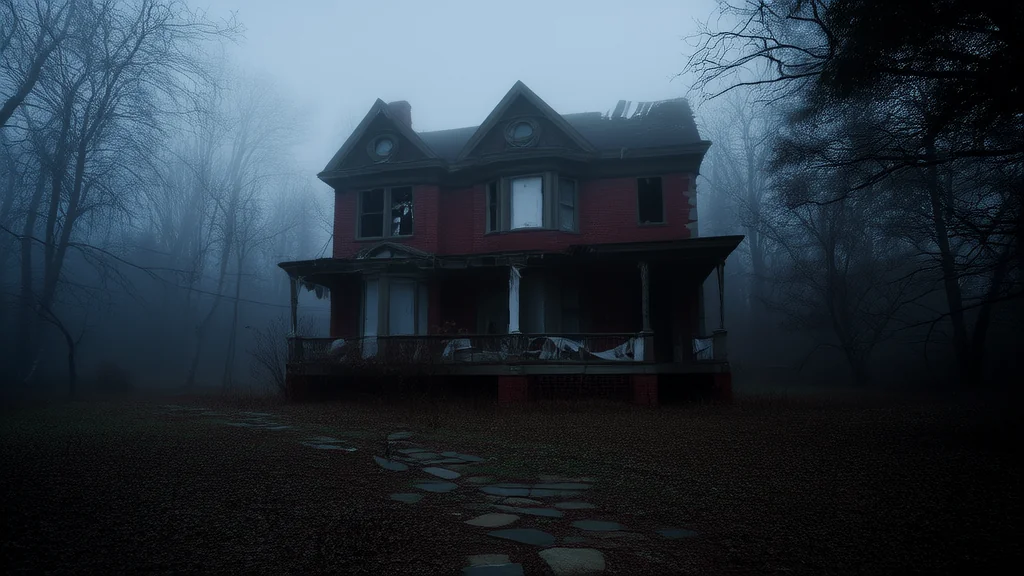🔮 Weird Tales & Urban Legends
The Vanishing Inventor and the House That Never Let Go

The old house at the edge of town had stood for over a century, its red brick walls weathered by time and neglect. It was said that no one who entered ever left the same. Locals whispered about the man who once lived there, a reclusive inventor who vanished without a trace, leaving behind only his workshop and a locked door that never opened. The town council had long since declared it unsafe, but still, curious souls found their way to the crumbling structure, drawn by an unseen force.
One such person was Elara, a young woman with a fascination for forgotten places. She had heard the stories, of shadows moving where there were none, of whispers in the wind that spoke her name. But she wasn’t afraid. She believed in mysteries, not monsters. So when she found an old map leading to the house, she set out on a quiet autumn afternoon, the air crisp with the scent of fallen leaves.
The house loomed ahead, its windows like empty eyes staring into the distance. A rusted gate creaked as she pushed it open, the sound echoing through the silent yard. The front door was slightly ajar, as if waiting for her. She stepped inside, the air thick with dust and something else—something ancient. The floorboards groaned beneath her feet, and the silence felt heavy, pressing against her ears.
In the foyer, a grand staircase spiraled upward, its banister carved with strange symbols that seemed to shift when she looked away. To the left was a parlor, its furniture draped in white sheets, and to the right, a study filled with books and papers, all neatly arranged as though someone had just left. But there was no one there.
Elara moved deeper into the house, her footsteps muffled by the thick carpet. She found a kitchen, a dining room, even a library, each room more intact than the last. It was as if the house had been frozen in time, preserved by some unseen hand. She ran her fingers along the wooden shelves, feeling the grain of the wood, and noticed that the books were all written in a language she didn’t recognize. Yet, when she opened one, the words made sense, as if they had always been part of her mind.
Upstairs, she discovered a bedroom with a large window that overlooked the town. Outside, the sun had begun to set, casting long shadows across the floor. As she stood by the window, she heard a faint melody, soft and haunting, drifting through the air. It was not music from any instrument, but a voice, low and sorrowful, singing a song she had never heard before. She turned around, expecting to see someone, but the room was empty.
In the next room, she found a mirror, its surface dark and cracked. When she looked into it, her reflection did not move. She blinked, and the reflection blinked back. Her heart skipped a beat, but she forced herself to stay calm. She reached out, and the mirror rippled like water, revealing a different image: a man standing in the same room, watching her. He was older, dressed in a suit, his face pale and weary. His lips moved, but no sound came out. Then, he smiled, and the mirror went black again.
She stumbled back, breathless, and hurried down the stairs. The house felt colder now, the air thick with something unseen. She tried to leave, but the front door was locked. She pounded on it, called out, but no one answered. The whispers returned, this time louder, surrounding her, speaking in voices she couldn’t understand. They weren’t threatening, but they were persistent, as if trying to tell her something.
As she backed toward the hallway, she noticed a door at the end of the corridor that had been closed before. Now, it was open, revealing a small room with a single chair and a desk. On the desk sat a journal, its pages filled with neat handwriting. She opened it and began to read. The entries were dated from years ago, describing the same house, the same silence, the same presence. The writer spoke of a feeling of being watched, of dreams that felt real, of a choice that had to be made. At the end, the final entry was incomplete, as if the writer had been interrupted.
Elara closed the journal and looked around. The house was still, the whispers gone. She took a deep breath and stepped toward the door. This time, it opened easily. She ran outside, the cold air hitting her like a wave. Behind her, the house stood silent, unchanged, as if nothing had happened.
But as she walked away, she kept thinking about the man in the mirror, the song in the wind, the journal that seemed to know her. And she wondered—was she the one who had entered the house, or had the house entered her?
Published on en
🔗
Related Sites
- AI Blog — AI trends and tech news